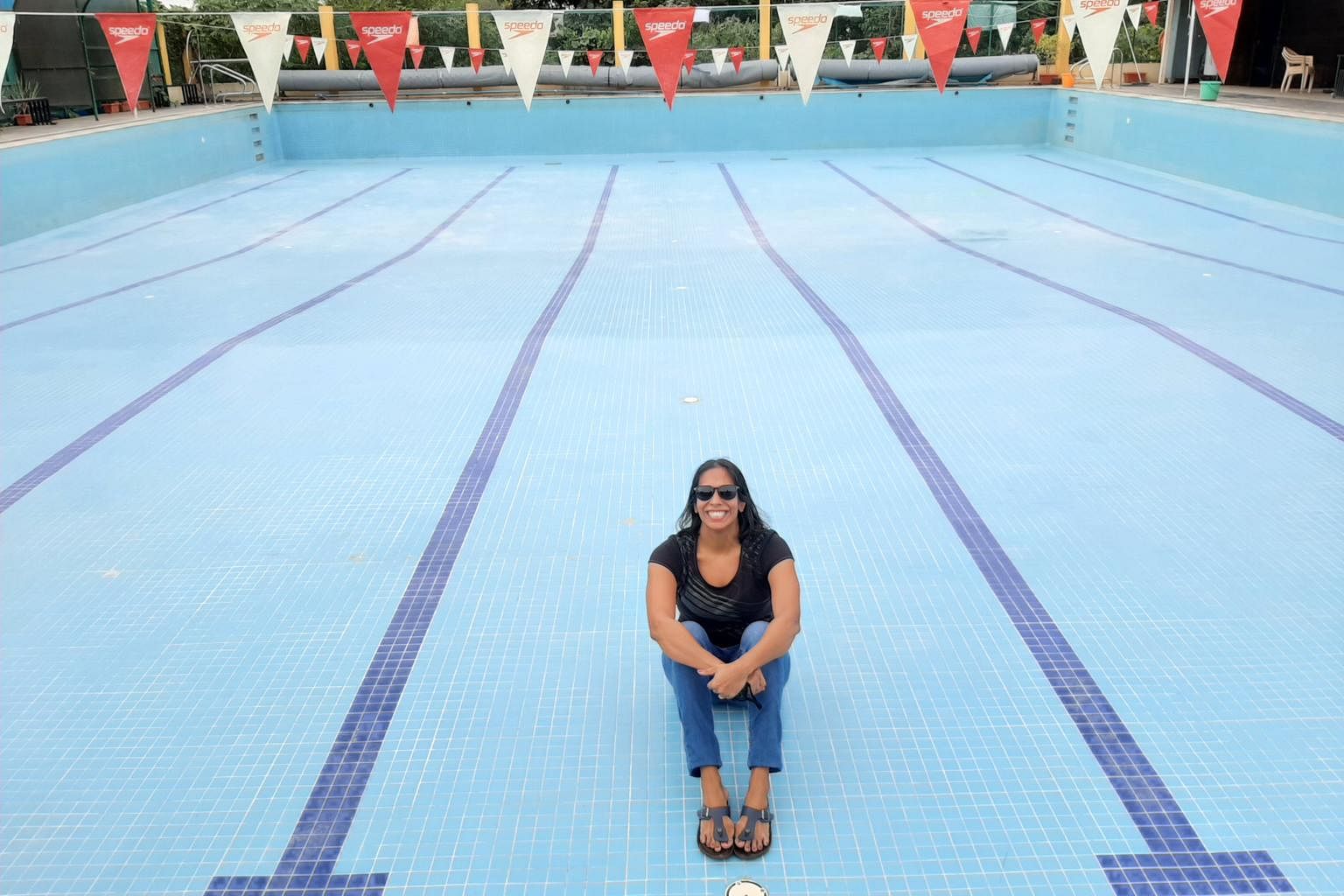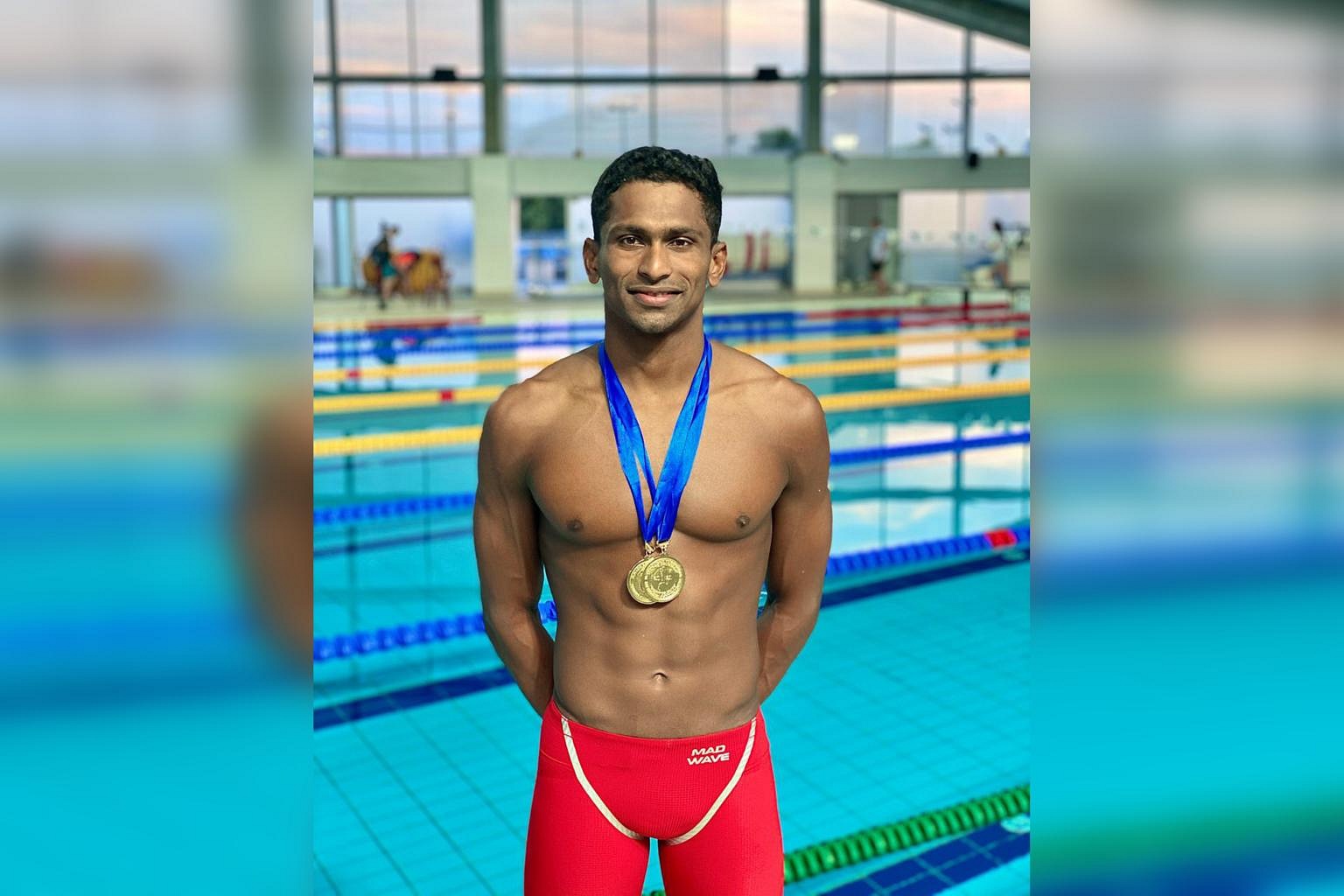BANGALORE - Kerala police officer Sajan Prakash became the first Indian swimmer over the weekend to qualify for the Tokyo Olympics by clocking 1min 56.38sec in the 200m butterfly category in Rome, Italy.
But the 27-year-old, who represented India at the 2016 Rio Olympics, did not have it easy.
The country's elite swimmer spent the past year training far from home in Thailand and Dubai because swimming pools in India were forced to stay closed during the pandemic.
When he was out of water for months in India, Mr Prakash told ESPN in May 2020, his body felt like it was "made out of stone".
Another Indian swimmer, Mr Srihari Nataraj, qualified for the 100m men's backstroke category in Rome last week, after two nail-biting trials. In the first, the 20-year-old had fallen 0.05 second short of the time that would have guaranteed him an immediate place in the Tokyo Olympics.
"It has been frustrating that Indian swimmers couldn't do our absolute best training because of lack of access to pools for nearly a year under the lockdown," India's fastest backstroke swimmer said to The Straits Times on the phone from Rome. He is now awaiting approval from the International Swimming Federation.
As India went into a nationwide lockdown in March 2020, sports facilities, gyms and swimming pools were forced to close their doors for months, and again when states imposed restrictions during the devastating second wave in April this year.
Top-level competitive athletes were kept out of the pool for at least nine months, unless their managers wrangled exemptions for them to train.
"When I went to Rome, athletes from other countries were shocked that we were off the water for two months this year, on the eve of crucial international qualifiers. That is usually the time to tune up your technique," said Mr Nataraj.
India sent two swimmers to the 2016 Rio Olympics, who did not advance beyond the heats. The country was hoping to send six this year.
Mr Nataraj trains in Bangalore, India's swimming capital, home to the country's top coaches, nine Olympic swimmers and at least five premier swim training centres. But even when the Karnataka state government eased restrictions on gyms, factories and restaurants, pools had to remain closed.
Mr Satish Kumar, secretary of the Karnataka Swimming Association (KSA), said: "The whole world has opened swimming pools except for India. They expect us to do miracles in sports with these kinds of rules imposed on us without any scientific evidence.
"We have been convincing the health department, showing reports from the World Health Organisation (that show that chlorinated pools don't cause virus transmission), but they're just not accepting it."
Swimming in a well-maintained, properly chlorinated pool is safe, according to WHO guidelines.
Many countries, including Singapore, the United States and Sri Lanka, have allowed swimming pools to operate with strict hygiene protocols and limited numbers.
"Swimming is the safest sport in this pandemic, but Indian officials are being unfair. They're just not looking at the evidence," said coach Nisha Millet.
Her swimming academy kept its pool water filtered and paid 24 coaches and staff for seven months "despite zero revenue" as she waited for the restrictions to be lifted.
When she couldn't afford to keep it up, some coaches returned to their home towns. Others started working with food delivery apps. The academy also emptied its pools.

When the lockdown was lifted last October, Ms Millet held classes in select pools with small batches of eight children to a pool, and only four lap or fitness swimmers in bigger pools - until the second wave of the pandemic broke in April.
Mr Kumar said: "No swimmer who used the pools from October to March got Covid-19. Not a single one. If academies follow this protocol and safe distancing, why shouldn't they operate?"
In April, the KSA requested that the government allow competitive swimmers to return to the pool and permit 46 affiliated centres to open.
Some, like Mr Nataraj, were given permission to train largely in Bangalore. National champion in the 50m and 100m breaststroke Likhit Selvaraj, 22, moved to coastal Mangalore to practise in a pond on his coach's ancestral farm.
The Sports Authority of India had to send Mr Prakash, the first Indian swimmer to qualify for the Tokyo Olympics, to Dubai this year to train.

Ms Deepthi Bopaiah, executive director of Bangalore-based GoSports Foundation, said: "Swimmers have had it the toughest in the pandemic because nothing can really replace swimming in water.
"Since they were young, they wouldn't have gone two days without the pool. That is their world, so it changes a lot of dynamics mentally and emotionally."
The non-profit tried to convince athletes it supports to use online platforms, educate them about Covid-19 safety at home, and mentally condition them to deal with the new normal.

For Mr Suyash Jadhav, a para swimmer supported by GoSports, spending nine months without access to a pool was scary. "But there was no point of being tense. I can't change the pandemic or the rules," he said.
In his hometown gym in Solapur, Maharashtra, Mr Jadhav modified his swim workouts to running workouts, exercised his core, and fixed his diet to maintain stamina and endurance.
He was tempted to swim in a nearby reservoir a few times, but said that "for short sprinters like me who swim 50m to 100m, the waves of open water can spoil our stroke technique".
In June, Mr Jadhav qualified for the Tokyo Paralympics slated for late August.
When asked if he is nervous about not having had enough pool time, Mr Jadhav chuckled.
"Despite all the pain, there is a good chance I'll bring home India's first Olympic medal in swimming," he said.


